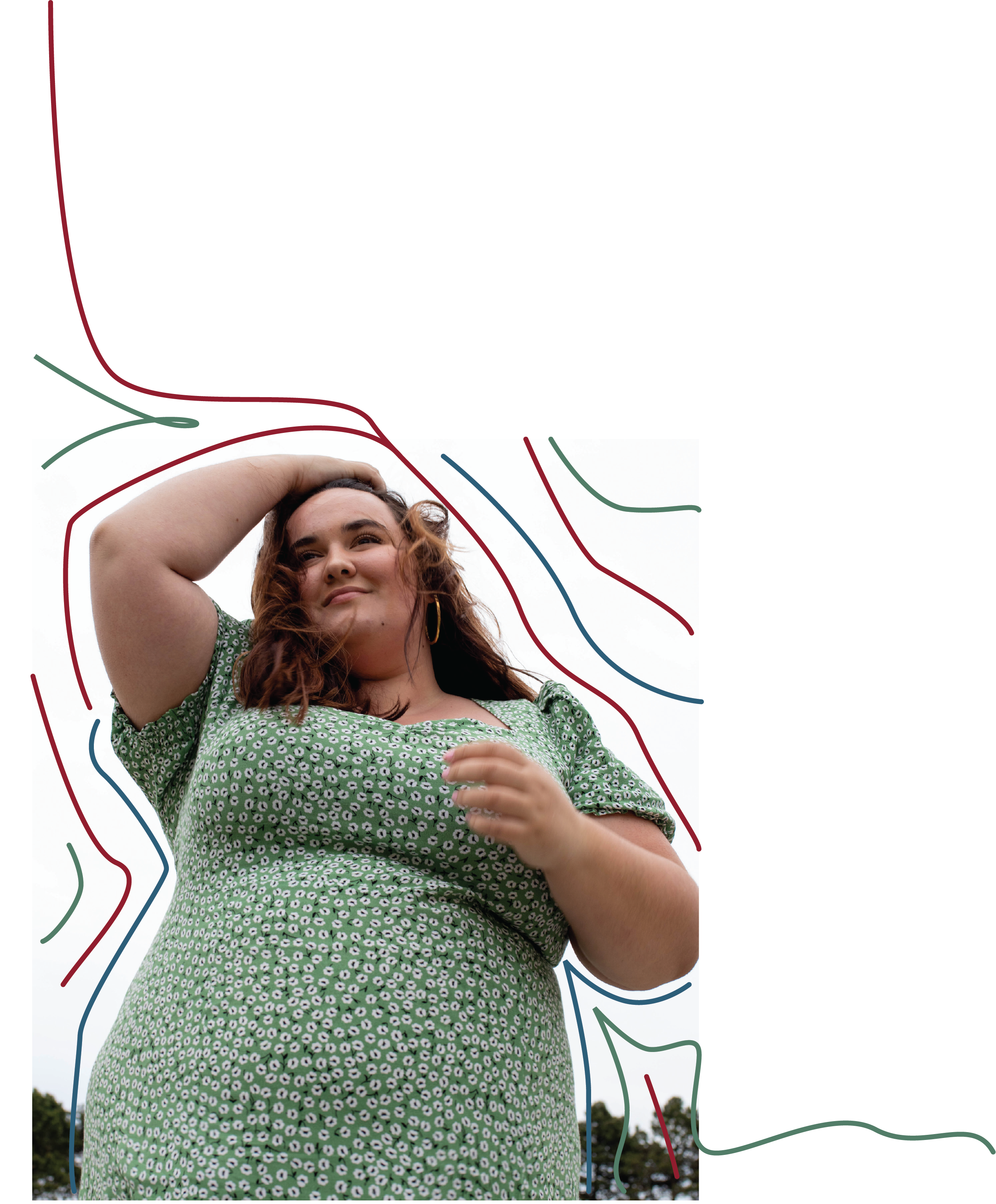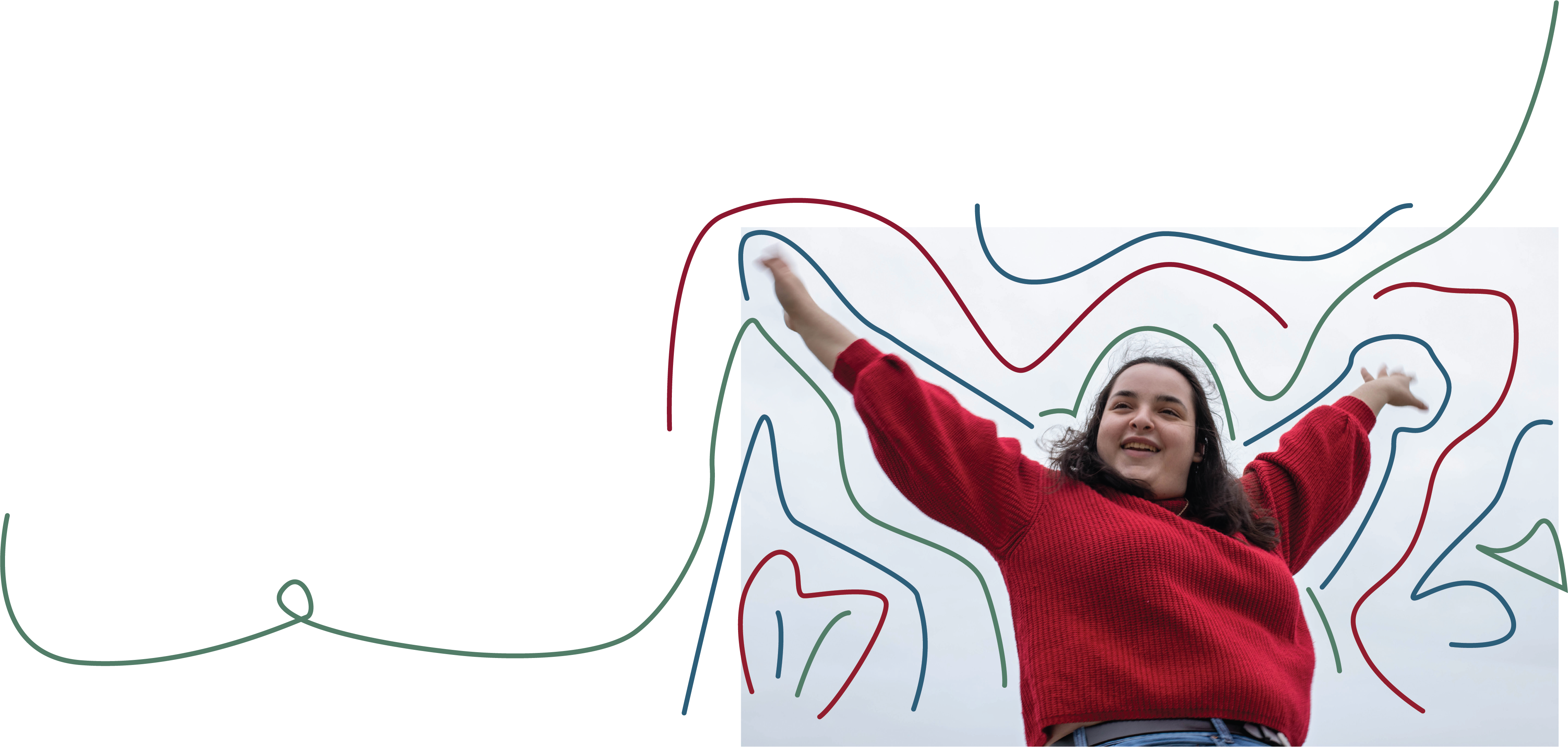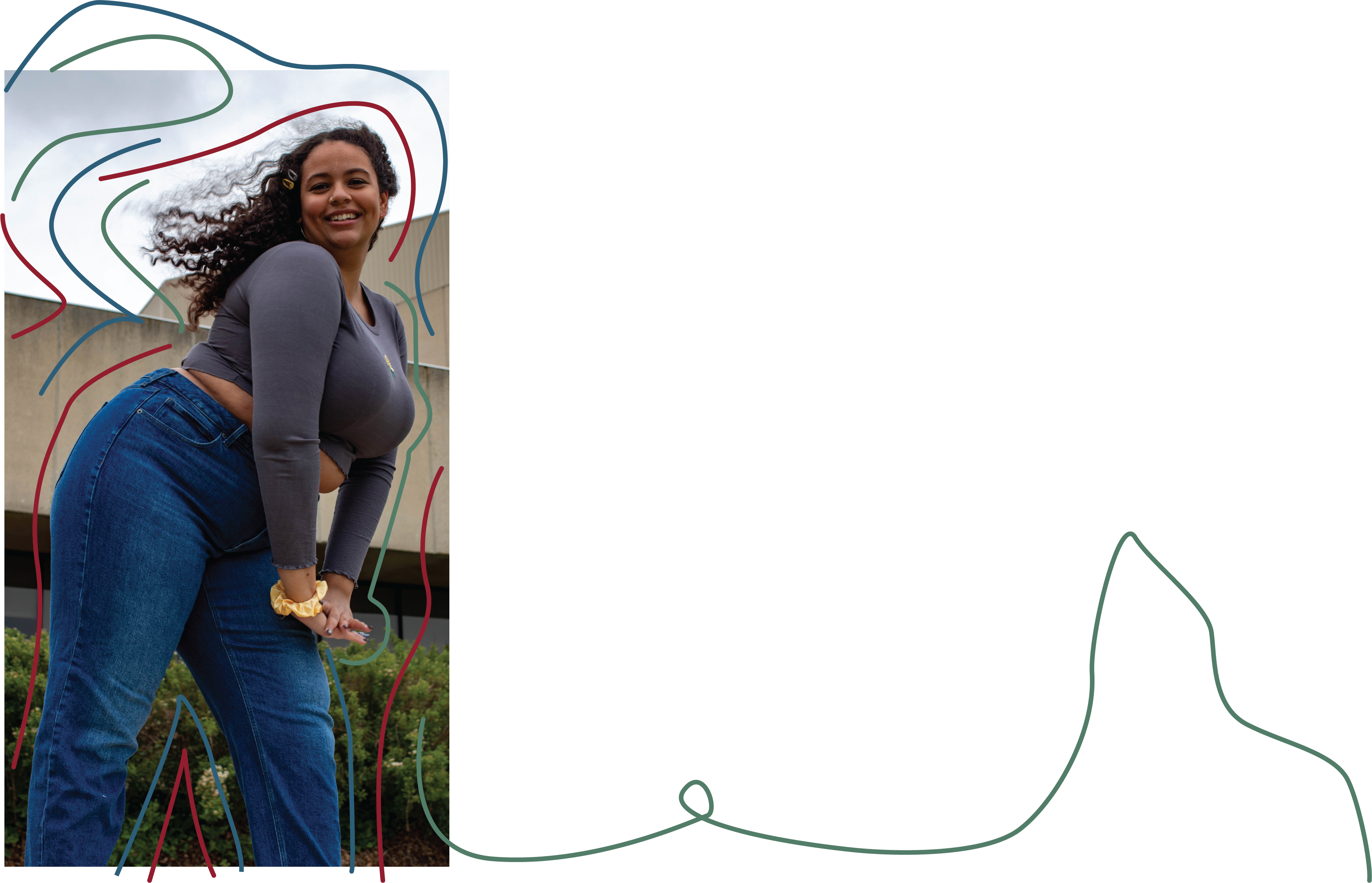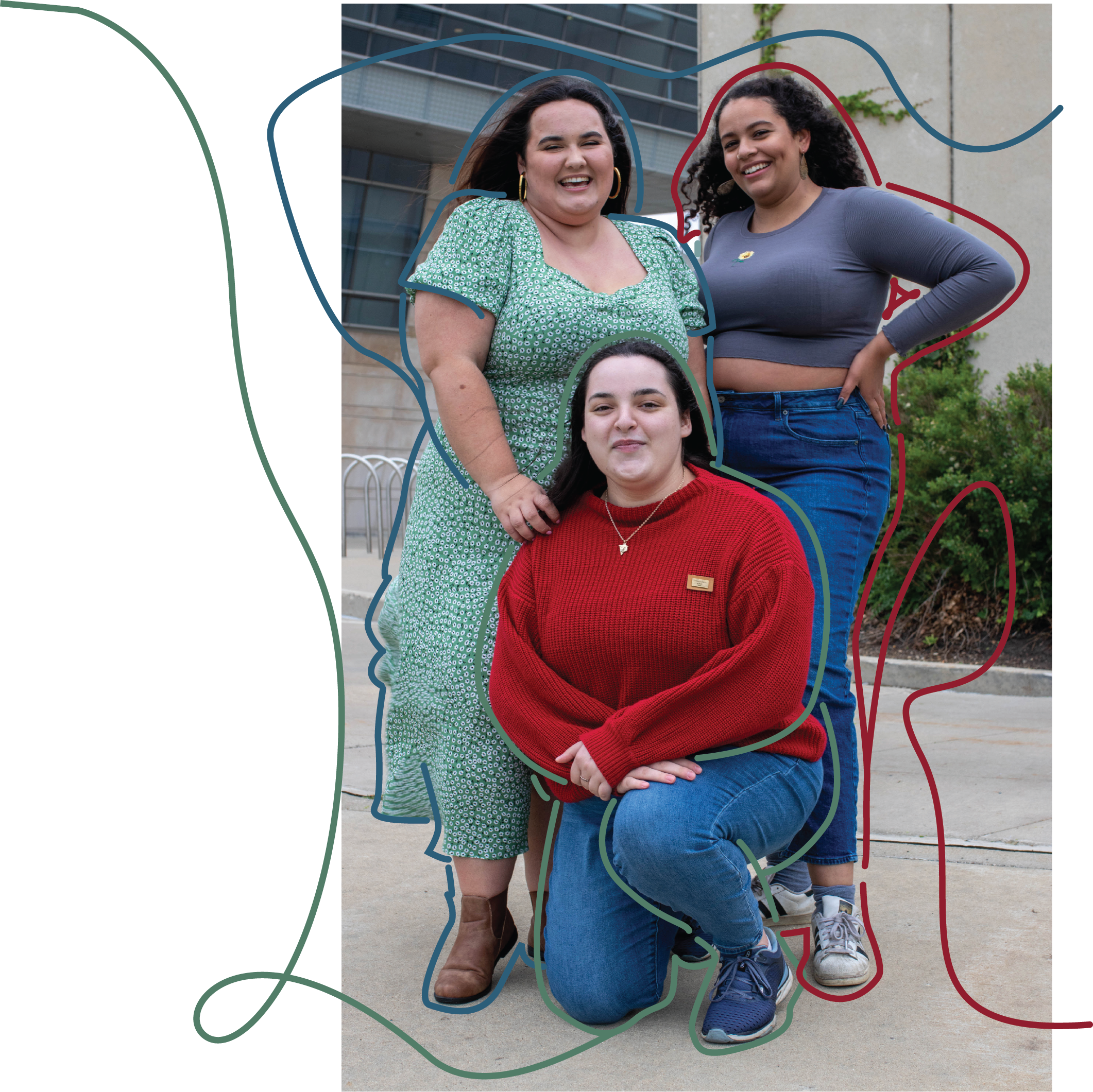Charlotte Oxnam loves roller coasters. As an incoming freshman at Northwestern, she was looking forward to the Six Flags trip at the end of Wildcat Welcome. She traveled to the park in buses packed with all her new friends and classmates, riding high after an exciting week of orientation.
That was until she got on the first ride. Once she sat down in the roller coaster car, the ride operator told her she wouldn’t fit and kicked her off. She says it felt like a kick to the gut.
“I will never forget getting kicked off this ride in front of all these people who I just met three days ago and was trying to become friends with,” says Oxnam, currently a McCormick second-year.
She tried to go on two other rides, but each time, she was told she couldn’t ride because of her size. Oxnam spent most of the rainy night crying alone in an empty pavilion until her Peer Advisor found her.
“This whole thing … was supposed to bring me together with my new classmates. Instead, I was being completely isolated,” she says.
According to Oxnam, the worst part is she blamed herself the next day for not predicting this or researching the park beforehand.
“I truly believed that the impetus was on me to make sure that the world fit me versus the impetus being on the world to make sure that they fit all people.”
Charlotte Oxman, McCormick second-year
Oxnam identifies as plus-size, this was not the first nor the last time she would feel excluded or marginalized because of her body. This othering of individuals who identify as plus-size or fat is typically known as fatphobia, anti-fat bias or anti-fatness.
Fat activist and writer Aubrey Gordon, who writes under the pen name Your Fat Friend, defines anti-fatness as “the attitudes, behaviors, and social systems that specifically marginalize, exclude, underserve, and oppress fat bodies.” Even though fatphobia might be more widely known, Gordon prefers anti-fatness or anti-fat bias because she believes fatphobia implies that the discrimination people face can be written off as a fear or phobia of fatness rather than a form of hatred and oppression. The movement against anti-fatness began in the 1960s, and fat people of color and fat queer people led the way. Today, fat activists continue to push for a change in the way society views fat people, using new avenues like social media to raise awareness.
Some students who identify as fat and plus-size have found healing and body acceptance while at Northwestern, but they have also experienced instances of anti-fatness at the hands of University staff, peers and even friends. Students like Oxnam want anti-fatness to be seen as a legitimate form of discrimination and encourage others to educate themselves so they can be allies in combating it.
What being fat means
When Oxnam arrived on Northwestern’s campus, she was thrilled to see other students who looked like her, especially because she was the only plus-size person in her grade at her boarding school in Delaware. However, when she entered the social scene, Oxnam found that diversity didn’t mean there wasn’t anti-fatness on campus.
If Oxnam wanted to go to a fraternity party, she made sure she was with her conventionally attractive friends because she was worried they wouldn’t let her in if she went alone. Her fears were confirmed one night during the fall of her first year when she arrived late to a Halloween party at the Sigma Nu fraternity. All her friends were already inside. When she tried to enter, the fraternity member at the door told her the party was full.
“Then a really pretty, skinny, blonde girl from behind me came in, and all of a sudden, there was a spot in the room,” she says.
Karina Karbo-Wright, a Weinberg third-year who uses she/her and they/them pronouns, was bullied as a child for her size. However, it wasn’t until college that she began to understand it as anti-fatness.
“I think I was almost like, ‘Oh, this is what happens to fat people. This is what being fat means,’” Karbo-Wright says.
At Northwestern, Karbo-Wright saw more diversity in body shapes and sizes and felt more comfortable — that is, until she started dating her current partner as a first-year. He’s a varsity athlete, and she says he was considered very “desirable and attractive” among her circle of friends at the time. When they started dating, she says her friends’ reactions were horrible.

“People would bring up to me all the time, like, ‘Oh, he’s probably going to cheat on you because there’s … other girls here,’ but we know what that connotation is,” Karbo-Wright says.
Some of her former friends would make small remarks regarding her size. Karbo-Wright says it was the little things they didn’t even realize were microaggressions, like saying, “Oh, we’re the same size?!,” “Oh my gosh! My shirt fits you?!” or expressing surprise that they shared a bra band size.
“It’s so little … but the impact stays with you,” Karbo-Wright says. “I’m telling you now about things that are arguably almost three years ago, and they stay with me because of how harmful it is.”
Sometimes anti-fatness comes in the form of small, thoughtless acts of exclusion. Both Oxnam and Karbo-Wright cite student group merch selection and distribution as a particularly stressful time. Karbo-Wright has a pet peeve when straight-sized people, or people who are not plus-size, choose a bigger size for an aesthetic, “baggy” look because it could mean there aren’t enough of the size she actually needs. Sometimes student groups don’t think about getting plus-sized apparel in the first place, even when they have plus-size members. Before her sorority voted to disband, Oxnam was a member of Gamma Phi Beta, a space where she felt accepted and comfortable in her body. However, during Oxnam’s bid night, they didn’t have a bid t-shirt that fit her. The biggest size was a unisex large.
“It fit me so terribly. It was so skin-tight,” Oxnam says. “But I squeezed myself into it because I didn’t want to be the only one not wearing the shirt.”
When she asked the sorority leadership about it, they said they didn’t even think to order a shirt in her size, or any size above a large for that matter.
On an institutional level
Oxnam and Karbo-Wright have not only experienced anti-fatness at the hands of their peers, but also by University staff. Karbo-Wright works in the Walter Athletics Center, the gym for varsity athletes connected to the Ryan Fieldhouse.
During Winter Break last year, Karbo-Wright was locking up a room at night when members of the athletics department administration stopped her. She says they trapped her in the room and asked, “Do you belong here?” before grilling her about her job. At the time she felt it was motivated by racism and anti-blackness and ended up reporting it to the Office of Equity. But looking back on the experience, she wonders if it could have been motivated by anti-fatness as well.
“It was also like the ‘not belonging here’ felt a little bit heavier because there are black athletes [in Walter],” Karbo-Wright says. “So it’s interesting that that was the choice of words.”
Morgan Frost, a Communication first-year, only started identifying as plus-size in April when she was interviewing for student theatre boards. She was asked what issues mattered to her and said that as a plus-size person, she wanted to see more fat people onstage. That was the first time she called herself plus-size. For a long time she did not want to admit she was plus-size because she always thought she would be skinny one day and identifying as plus-size felt permanent.
Frost believes that professors and students in the theatre department have biases against fat people, especially when it comes to casting romantic leads. This prejudice has impacted the way she views her own abilities.
“I feel like I put a lot less worth in my talent than I should because of the body that it comes in,” she says.
Lack of accessibility for those who identify as fat and plus-size is also built into the campus itself. Several students cite how the size of Northwestern’s desks and chairs, especially those in large lecture halls, are inaccessible to those with bigger bodies. Frost hates getting a COVID-19 test at the Donald P. Jacobs Center because she doesn’t fit into the lecture hall seats to complete the test.
“I can barely fit in them … They were not built for me,” Frost says.

People who identify as fat or plus-size also often report instances of anti-fatness from medical institutions and professionals. Oxnam was in sixth grade when she was diagnosed with polycystic ovarian syndrome (PCOS), a hormonal condition affecting 6% to 12% of US women. A common symptom of PCOS is weight gain and difficulty losing weight.
Doctor after doctor has suggested that Oxnam lose weight to manage her symptoms. However, there are other forms of treatment, and Oxnam says she doesn’t have any medical issues that stem from her weight. Some doctors even suggested gastric bypass surgery, which induces weight loss by removing a part of the stomach.
At one point, Oxnam was referred to a doctor from Northwestern University Health Service (NUHS) at Searle Hall to discuss her hesitations around the surgery. When Oxnam visited NUHS, the doctor advised against gastric bypass surgery due to Oxnam’s age but still told Oxnam to try keto because it had “worked for her.” In the same visit, the doctor also gave her an anti-dieting book.
“You’re giving me a book to read about why diets are bullshit, but you’re telling me to try this diet? Interesting,” Oxnam says.
Oxnam was also frustrated that no one had ever asked her if she felt healthy or had any interest in losing weight. In high school, Oxnam was a three-sport varsity athlete who trained at least two-and-a-half hours a day for six days a week. She says the doctor did not stop to ask her about this once. Oxnam’s experience with NUHS was by no means unique — she has reported and switched doctors numerous times for behavior like this — but it’s still frustrating every time it happens.
“No one asked me if losing weight was actually what I wanted to do … I’ve just been told that it was like a medical necessity,” she says. “I’ve been fine my whole life, and I’ve been fat my whole life. So what medical thing are we worried about here?”
Elizabeth Curtis, a SESP fourth-year who uses they/them pronouns, had a similar experience to Oxnam when they sought care at NUHS this past summer for acid reflux and stomach issues. They scheduled a phone appointment because the medicine NUHS had given them had not alleviated their symptoms. The doctor asked for their height and weight and later proceeded to tell them to go on a diet and eat less without ever asking them what their habits already were.
“It feels like pseudoscience. They’re telling me to do these things without actually examining what is happening in my body. They’re just making assumptions.”
Elizabeth Curtis, SESP fourth-year
Curtis is also Black and says that their mistreatment was not only an instance of anti-fatness, but also racism and anti-blackness.
“I know that my fatness contributes to the dehumanization of my blackness at the same time, and they play off of each other,” Curtis says.
They say that NUHS does not take Black people — especially fat, Black people — seriously. Along with others, Curtis has resorted to seeking outside care.
“While the way that I think that fat people across the board get treated by doctors is really unacceptable, it is definitely compounded for people of color and especially fat, Black people,” Curtis says.
Health is different for everyone
Kate Merkle is a registered dietitian nutritionist, social worker and founder of Nourishment Works, a Chicago-based dietetics group practice. Nourishment Works embraces an approach based on intuitive eating and Health at Every Size (HAES), a movement that embraces body diversity and self-care and challenges scientific and cultural assumptions about size.
Merkle has worked with straight-sized clients who have health concerns such as diabetes, high cholesterol and high blood pressure. Rather than being told to lose weight, doctors offer straight-sized patients options for treatment. The same does not often happen for those who identify as plus-size or fat, Merkle says.
“Those things do not get reviewed with people in larger bodies, because the answer is … ‘If you lost weight, it would help your blood pressure,’ and that’s not always true for the clients I work with,” Merkle says.
According to Merkle, requiring patients to lose weight before prescribing treatment, such as high blood pressure medication or knee replacement surgery, is neglectful and essentially withholding medical care. She says the mistreatment of those with bigger bodies has a greater negative impact on mental and physical health than problems supposedly arising from bodies themselves.
“Your body isn’t the problem. It’s the way our world treats different bodies, neglects different bodies, mistreats certain bodies,” she says. “That’s what affects our health negatively.”
Merkle is very clear that diets are harmful and have the potential to spark or retrigger eating disorders. She also notes they are generally ineffective, a sentiment supported by numerous studies, including a 2011 study in the Journal of the American Dietetic Association. The study showed that dieting predicted an increase in binge eating and was correlated with an increased Body Mass Index (BMI) in both male and female adolescents.
Frost began dieting in order to lose weight during her junior year of high school and continued for two years until her doctors became concerned because she had lost about 20 pounds in a month. They referred her to a nutritionist who indicated she had an eating disorder. Even though Frost’s doctors were concerned about her rapid weight loss, they also praised her for being “healthier.”
“Everyone in my life was like, ‘No, you’re doing a great job. You’re eating your 1200 calories and losing weight, and you look good,’” she says.
Frost believes that she’s much healthier now that she’s in recovery and gained some of the weight back.
“Why do we equate weight loss with being healthier? I was not healthy before,” she says.
Merkle stresses that no one should be treated as lesser if they do not meet or are not trying to meet the societal standard of “health.”
“You don’t have to be in pursuit of health to be treated appropriately, to be worthy of love and belonging,” Merkle says. “Health is going to look different to different people.”
Oxnam thinks the biggest reason body size isn’t taken seriously as a marginalized identity is because most people assume that someone’s size is directly linked to their life choices — that “if they didn’t want to be their size, then they should change their lives.”
“I will never naturally become a size six, and having the assumption that I could do that, and that it’s just me being lazy and choosing not to, I think allows people to see issues around support and accessibility for plus-size people being not a priority,” Oxnam says.
Journey to body acceptance
Despite the trauma they’ve experienced because of anti-fatness, Karbo-Wright and Oxnam have both grown in terms of body acceptance while at Northwestern.
Karbo-Wright identifies as fat, but it wasn’t always that way. Before coming to Northwestern, she had never met people who were happy being fat or had the vocabulary to talk about it as an identity. Meeting people in social justice and activist circles her first year helped her use “fat” to refer to herself.
“Those words are just regular words that can also be used to insult people … but they’re so important to me because they’re a part of my identity,” Karbo-Wright says. “It clearly shapes how I conceptualize things and what I think about, and so it has that same weight as all my other identities.”
Even though Karbo-Wright identifies as fat, she still feels uneasy around the word because of how it’s been weaponized in the past. She winces if a straight-sized person uses the term to identify her, even if they’re not using it negatively. While Oxnam more often uses the term plus-size, she is also comfortable describing herself as fat, and like Karbo-Wright, is uneasy when others use it.
“That’s my place to say if it’s okay to call myself fat,” Oxnam says. “But nine times out of 10, if someone out of the blue is using that term for me, they’re not using it as just a descriptor, and that’s where I have an issue with it.”
While Karbo-Wright started using the word “fat” freshman year, it wasn’t until the COVID-19 pandemic that she really internalized it as part of her identity. Karbo-Wright had been steadily gaining weight throughout college, but she was also eating healthy throughout and in recovery from an eating disorder. During quarantine, she reached the same size as her mom.
“I reached a size … that I told myself when I was younger I would never go to,” Karbo-Wright says. “I was always like … ‘If I’m not her size, I’m still okay.’”
Reflecting during quarantine, Karbo-Wright was able to see her weight gain as her body reacting to current events. Her home in Minneapolis, Minnesota is only a few blocks away from where the police murdered George Floyd. Looking at the climate of racial injustice and an ongoing pandemic, she understood that it was natural for her body to change as she was emotionally processing.

“I realized I really need to just allow my body to make the changes that it needs to make,” Karbo-Wright says.
After that moment, she decided she would truly incorporate it into her identity. Now Karbo-Wright thinks of “fat” as just a descriptor, the same way she would say she’s Black, bisexual or poor.
In December of 2019, Oxnam started a blog called Cue the Curves, which was originally meant to be a directory for women to find plus-size clothing. She likes to refer to Cue the Curves as a “letter to middle school me” because it was so difficult to find plus-size clothing growing up. The blog quickly morphed into a forum for women to not only find cute clothes, but also talk to other plus-size women.
Oxnam started Cue the Curves through The Garage’s Propel program, which gives female students networking and mentorship opportunities to help nurture their ideas. With The Garage’s Jumpstart program, Oxman and her team will receive $10,000 to work full-time this summer on turning Cue the Curves into an app. They already have a version in beta.
The messages and comments Oxnam receives online show her the worth of Cue the Curves. Nine months ago, Oxnam posted about her prom shopping experience and tips she had for others. Afterward, a teenage girl direct-messaged her on Instagram thanking her because she was terrified to go prom dress shopping before seeing Oxnam’s post. The girl said that her post allowed her to have a positive experience prom dress shopping with her mom and friends.
“I think those are really, really powerful moments for me because I know exactly how it feels to feel so alone … so the fact that I made someone not feel alone just warms my heart,” Oxnam says. “One DM every three months, and I’m fueled to keep going.”
Education and reflection
Looking back at their experience so far at Northwestern, both Oxnam and Karbo-Wright wish the University and the people around them were more mindful about anti-fatness.
Karbo-Wright says reading books about anti-fatness and educating yourself is a good first step in being an ally. She suggests “Fearing the Black Body: The Racial Origins of Fat Phobia” by Sabrina Strings, and Curtis suggests Aubrey Gordon’s book, “What We Don’t Talk About When We Talk About Fat.”
Karbo-Wright says it was hurtful when her straight-sized friends would constantly say “I’m so fat” while in her presence freshman year. Oxnam also asks that if you’re straight-sized, do not call yourself “fat” or say how much you need to lose weight in the presence of people who identify as plus-size or fat.
“What you’re actually deep down saying is ‘The worst thing I could imagine right now is looking like you,’” Oxnam says. “That cuts like a knife.”
Renee Engeln, a psychology professor at Northwestern and creator of the Body and Media Lab, wrote in an email to NBN that while it’s normal to struggle with body image, it’s important to consider how you voice it. She says that engaging in negative body talk risks pulling others into a downward spiral because it’s hard to avoid thinking about your own body when someone else is complaining about theirs.
“A lot of people say, ‘Well, I didn’t mean to be anti-fat when I talked about how I need to lose weight. I just meant it to be about me, not other people,’” Engeln says.
“If you find fat on your own body to be disgusting, how is someone to trust that you don’t find fat on their body disgusting as well?”
Renee Engeln, Northwestern Psychology Professor
Oxnam says you can still express insecurities about your body in front of others, but it’s better to be specific and avoid using the word “fat.”
“You can tell me, like, ‘Wow, I feel really self-conscious about my legs, and they’re really showing in this dress.’ That’s fine. We can talk about that,” Oxnam says.
Frost, however, finds talking about reverse anti-fatness or fatphobia is missing the point. “It really bothers me when people say there’s skinny-phobia too,” Frost says. “Everyone has body insecurities, but your body insecurities won’t prevent you from getting health care and getting a job.”
Karbo-Wright also just wants to be treated normally — to have people celebrate her the same way they might for a straight-sized person.
“It makes me know that the people around me don’t just see me as a fat person in a negative connotation,” Karbo-Wright says. “They see me as a fat person who is all the other things that I am too.”

